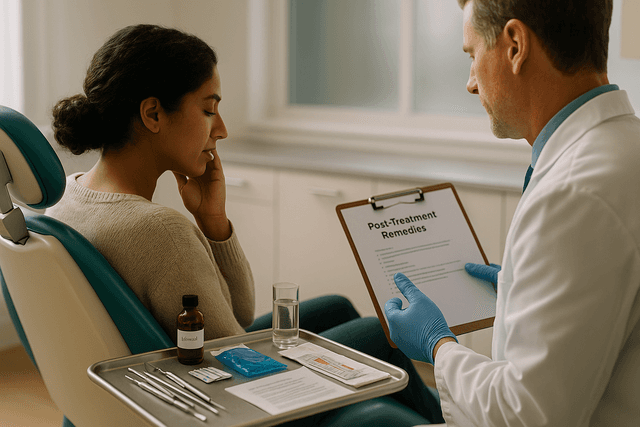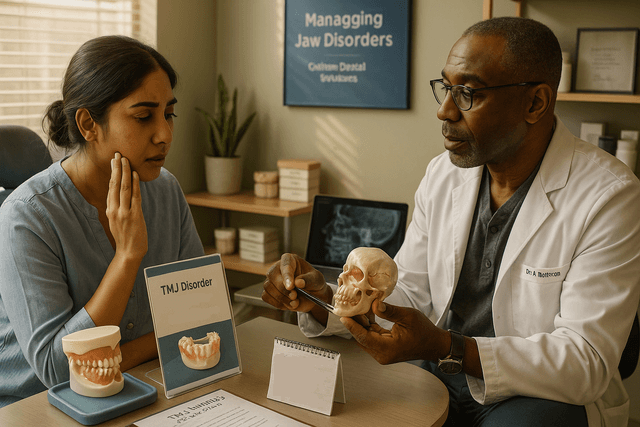General Dentistry
7 min read
May 22, 2025
Can You Fix an Overbite Naturally? Tips, Myths, and What’s Possible
If your smile’s been feeling a little off, or your jaw’s been popping more than your morning cereal, you might be wondering if that overbite of yours can be fixed without braces or surgery. You’re not alone. Overbites are one of the most common dental concerns out there, and the idea of correcting them naturally is tempting.

If you’re searching “can you fix an overbite naturally,” you’re probably hoping for a magic solution that doesn’t involve months of braces or a date with jaw surgery. Totally fair. Overbites are common, one of the most common dental issues, in fact, and while some cases are mild, others can mess with more than just your smile. So, is it possible to fix your overbite without getting wired up or going under the knife? Let’s break it down and talk facts, myths, and everything in between.
What Exactly Is an Overbite?
Before we talk about fixing it, let’s understand what an overbite really is. It’s when your upper front teeth significantly overlap the lower front teeth. Some degree of overlap is actually normal, but when that overlap becomes too much, we’ve got what dentists call a “malocclusion,” specifically a type called an overbite.
Depending on the severity of the overbite, it can lead to problems like jaw pain, speech issues, tooth wear, or even TMJ (temporomandibular joint disorder). In severe cases, it may affect your facial structure. So, no, it’s not always just a cosmetic thing. An overbite can cause real discomfort and long-term dental problems if it’s not managed.
Fix an Overbite: Is Natural Correction Possible?
You’re wondering how to fix your overbite without braces or surgery. Here’s the honest truth: it depends. A slight overbite or minor misalignment caused by bad habits might respond to natural interventions. But a pronounced overbite tied to the shape of your jawbone? That typically can’t be corrected with orthodontic treatment alone, let alone natural methods.
Still, there are some low-impact, non-invasive things you can try to support better jaw alignment and oral health, especially for younger folks whose bones are still developing. Alongside managing gum disease, jaw exercises may help too. But spoiler alert: if your overbite is severe, you’ll likely need professional treatment.
Overbites: What Causes Them in the First Place?
Overbites don’t just appear out of nowhere. The most common causes of an overbite include:
Genetics (thanks, Mom and Dad)
Thumb-sucking past age 3
Tongue thrust
Extended pacifier use
Nail-biting or pen-chewing
Misalignment from baby teeth falling out early
Habits that push the upper teeth forward or pull the lower teeth back
These issues can throw off the natural balance of the teeth and jaw. In other words, sometimes you develop an overbite because of things totally out of your control, and sometimes, well, it’s because you chewed on pencils for a decade straight.
Dental Health and Overbites: Not Just a Cosmetic Issue
A lot of people assume overbites are only about looks. But ask any dentist or orthodontist and they’ll tell you otherwise. An untreated overbite can contribute to TMJ pain, uneven tooth wear, root canal, trouble biting into food, bleeding gums, and even breathing problems in some cases.
When upper front teeth overlap the lower front teeth too much, it can cause strain on the jaw muscles. That misalignment may snowball into headaches, jaw clicking, or chronic tension. Overbite can lead to a cascade of dental and skeletal problems if it’s ignored too long.
Can You Fix an Overbite Naturally? Let’s Talk Truth
Let’s tackle the million-dollar question: can you fix an overbite naturally?
If you’re dealing with a minor overbite or one caused by poor oral habits like thumb-sucking or tongue thrust, you might be able to manage or improve it through myofunctional therapy. This type of therapy uses exercises to retrain the muscles of the tongue, face, and jaw to encourage proper alignment.
There’s also a rising interest in jaw exercises, think of them like yoga for your mouth. These include things like chin tucks, controlled mouth openings, or tongue presses that can strengthen jaw muscles. But be clear: these are supportive at best. They’re not replacements for orthodontic treatment if the overbite is structural.
So, fix an overbite naturally? In minor cases, maybe. But it’s not a universal fix-all.
Fix Your Overbite: When You Need More Than Just Exercises
If exercises and habit-breaking don’t cut it, it’s time to consider your treatment options. Braces are the classic choice, and they’ve come a long way. You can get traditional braces, ceramic braces (less visible), or even lingual braces that hide behind your teeth.
Aligners like Invisalign are also popular for folks who want something less noticeable. Clear aligners gently push your teeth and jaw into better alignment over time. Depending on the severity of the overbite, clear aligners can be very effective, especially in cases where the misalignment is dental and not skeletal.
Now, if your overbite is caused by how your jaw has grown, meaning it’s not just the teeth but the entire structure, then we’re talking about jaw surgery. This type of jaw surgery reshapes the jawbone and is often combined with orthodontics for full correction. It’s not for everyone, but in severe overbite cases, it’s the only real option.
Management and Treatment Options for Overbite
When it comes to managing an overbite, here are the most common treatment options:
Braces or aligners to move the teeth into place
Myofunctional therapy to fix oral habits and jaw muscle use
Jaw surgery in extreme or orthognathic cases
Retainers post-treatment to maintain alignment
Dental implants or crowns for restoring tooth shape and function, in cases with worn teeth
The best approach depends on the causes of an overbite and its severity. A dentist or orthodontist can assess whether you need braces, aligners, or a surgical fix.
Braces: Still the Gold Standard
If you’re thinking of ways to fix an overbite and hoping to avoid braces, here’s the deal: braces come in many forms, and they still do the heavy lifting when it comes to correcting a bad bite. They work by applying constant pressure to slowly move the teeth and jaw into proper position.
Even though “get braces” might not be the advice you were hoping for, modern braces are more comfortable, less bulky, and way faster than they used to be. And for teens and adults alike, they remain a tried-and-true option.
Aligners: The Low-Key Fix
If you’re not excited about wires and brackets, aligners could be your best friend. Invisalign and other brands offer custom-fit clear aligners that are almost invisible and removable.
They’re a great option for people with mild to moderate overbites, especially when the issue is mostly dental. While aligners won’t help in every case, they’re a solid alternative to braces for many patients, and a great way to fix overbite discreetly.
Orthodontics and Underbite: What’s the Difference?
Quick aside: a lot of people confuse an overbite with an underbite. They’re opposites. In an overbite, your upper teeth stick out too far over the bottom teeth. In an underbite, the lower teeth stick out past the upper ones.
Both are types of malocclusion. Both can cause similar problems. And both have overlapping treatment options in orthodontics, including braces, aligners, and sometimes surgery. But understanding which you have is key to figuring out your path forward.
Causes of an Overbite: Can You Prevent One?
Can you stop an overbite before it starts? Sometimes. If caught early, especially in kids, an orthodontist can guide teeth and jaw development as they grow. Preventing habits like thumb-sucking or using pacifiers too long can also help prevent overbite from developing.
In adults, though, it’s more about management than prevention. By focusing on oral health, proper tongue posture, and not ignoring bite problems, you can at least keep things from getting worse.
Professional Treatment: Your Best Ally
Here’s the bottom line: while you might be able to manage a minor overbite with exercises and good habits, most overbites, especially if they’re moderate to severe, need a little extra help. That means working with a dentist or orthodontist who can guide you through your best treatment options, whether that’s braces, clear aligners, myofunctional therapy, or even surgery in the most complex cases. You could also consult a family dentist to begin with.
An overbite isn’t the end of the world. But it does deserve attention, because the longer you wait, the more complicated (and costly) the fix becomes.
Final Thoughts: What’s Possible (and What’s Not)
So, can you fix an overbite naturally? The honest answer is… sometimes, but not always. Fixing a minor overbite caused by muscle habits or tongue thrust might be doable with therapy or exercises. But for the majority of people, especially if your overbite is severe or tied to jaw structure, you’ll likely need professional treatment. That’s why not missing a dental check-up can make all the difference.
Can You Fix an Overbite Naturally Without Braces or Surgery?
In mild cases, yes, especially if the overbite is caused by habits like thumb-sucking or tongue thrust. Myofunctional therapy and jaw exercises can help retrain muscles and improve alignment. But for moderate to severe overbites, especially those linked to jaw structure, professional orthodontic treatment is usually necessary.
What Are the Main Causes of an Overbite?
Overbites can be caused by genetics, prolonged thumb-sucking or pacifier use, tongue thrusting, nail-biting, or misaligned baby teeth. These habits and hereditary factors can shift the position of the teeth or jaw over time, leading to excessive overlap between the upper and lower teeth.
Are Overbites Just a Cosmetic Issue?
No, overbites can lead to serious oral health problems if left untreated. They may cause jaw pain, TMJ disorders, speech issues, uneven tooth wear, and difficulty biting or chewing. In some cases, they can also contribute to breathing issues or damage to tooth roots and gums.
What Are the Most Effective Treatments for Fixing an Overbite?
The best treatment depends on the severity and cause of the overbite. Options include braces, clear aligners like Invisalign, myofunctional therapy, and in severe cases, jaw surgery. A dentist or orthodontist can evaluate your bite and recommend the right treatment plan for lasting results.
Read Next
Related Posts

General Dentistry
Comprehensive Dental Solutions with Dr. Bruno Dentist
Finding the right dentist isn’t just about clean teeth, it’s about feeling comfortable, cared for, and confident in your smile. At Dr. Bruno’s office, dental visits are transformed into warm, welcoming experiences rooted in compassion, expertise, and genuine connection.
4 min read
Sep 08, 2025

General Dentistry
Do Cavity Fillings Hurt After? What to Expect Post-Treatment
Tooth fillings are a routine dental procedure, but that doesn’t mean they’re without aftereffects. Many patients find themselves surprised by lingering discomfort or sensitivity once the anesthesia wears off. Understanding what’s normal, and what isn’t, can ease your mind and help you heal more comfortably.
5 min read
Sep 08, 2025

General Dentistry
Can a Dentist Fix TMJ? Expert Insights on Managing Jaw Disorders
TMJ disorders can turn everyday actions like chewing, talking, or even yawning into painful experiences. While many people associate dental visits with teeth and gums, your dentist may also be the key to diagnosing and managing jaw-related issues like TMJ.
5 min read
Sep 05, 2025
Don’t have time to research every dentist around you?
See why 30k+ patients trusted us